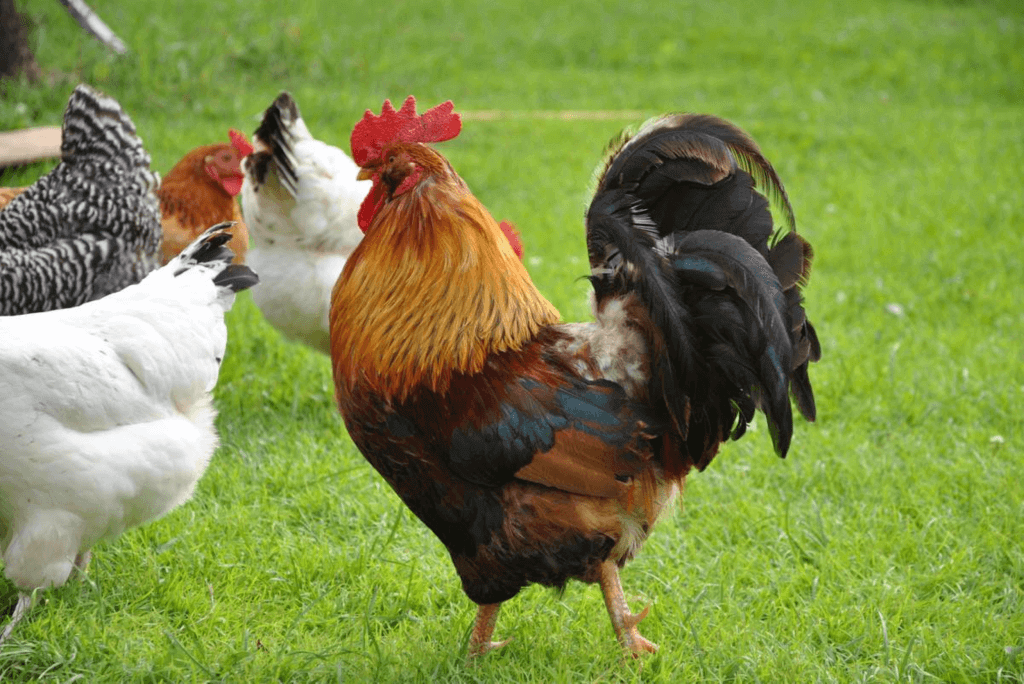International Respect for Chickens Day
International Respect for Chickens Day is observed next on Monday, May 4th, 2026 (150 days from today).
• How many days until International Respect for Chickens Day?

International Respect for Chickens Day is celebrated annually on May 4th since 2005 in order to celebrate chickens throughout the world and protest the bleakness of their lives in farming operations.
Just because we often treat them as food doesn't mean we can't treat them properly. All animals deserve basic respect and on May 4th it's the chicken's turn with International Respect for Chickens Day.
And no, you shouldn't respect chickens only on May 4th. That's just the date the U.S. Poultry Concerns (UPC) has designated to raise awareness of the suffering chickens have to endure.
And it's not just the food industry. Cockfighting, research and other activities are also very cruel to chickens.
In fact, every May is for International Chicken Respect Month. So even if you can't help the chicken on the 4th, you still have plenty of opportunities all month.
Some facts about Chickens
1) The chicken, Gallus domestics, is a domestic subspecies of the red jungle fowl, a member of the pheasant family native to Asia. Genetic studies have found that the gray jungle fowl also contributed to the evolution of chickens.
2) Chicken was used for cockfighting at first.
3) Chickens are not flightless completely. They can fly to get over fences or into trees.
4) These birds are omnivores. They will eat seeds and insects but also larger prey such as small rats and lizards.
5) The number of chickens is much more than any species of bird with 25 billion chickens in the world.
6) There are dozens of breeds of chicken, such as Dutch bantam, leghorn and Rhode Island Red.
7) Chicks are chicks. When they are old enough, they can lay eggs and become hens. Male roosters are called roosters, roosters, or roosters, depending on the country you're in.
8) A rooster tells a flock of chickens how to find food by “taking, taking, taking”. But the hens don't notice if they already know that there is food around.
9) Roosters perform a little dance called 'tidbitting', in which they make sounds (calls for food) and move their heads up and down, picking up and dropping bits of food. Researchers have found that females prefer males that are generally tidy and have larger, brighter combs on the top of their heads.
10) Scientists think the cock's snout – the beak that dangles below its beak – helps it attract the attention of the hen when it is plucking its feathers.
11) A hen will combine with many different males, after action has been taken; she does not want the offspring of a particular rooster and can expel her sperm. This occurs most often when males are lower in pecking order.
12) Chicken was the first bird to have its genome sequenced in 2004.
13) Bird flu (also called bird flu) is very contagious and can make chickens very sick and kill them. The highly virulent form of the disease can kill 90 to 100 percent of the birds in a flock in just 48 hours.
14) And which comes at first? Is it chicken or egg? All vertebrates have eggs, but the hard-shelled type first appeared in reptiles.
History of International Respect for Chickens Day
On the day, actions must be taken "to highlight the life and suffering of the chickens and encourage compassion for them." This day was started by Poultry Concerns of America in 2005. Karen Davis who is the founder believes that chickens should be kept in the environment and we should not use them for foods. The idea for the day originated with Harry Shearer - Le Show host and Simpsons voice contributor - who declared May 14, 2000 a National Chicken Day. It's Mother's Day, and he wanted to point out that the hen is a symbol of devoted motherhood.
Chickens are the most popular poultry species with about 25 billion in the world. There are also dozens of varieties. Chickens are a subspecies of, and are largely derived from, the red jungle fowl, native to Asia. To a lesser extent, the chicken can also trace its lineage to the gray jungle fowl. Chicks are chicks, young hens are pullets, hens old enough to lay eggs are hens, young roosters are called roosters, and adult roosters are called roosters or roosters.
Chickens are more domesticated than any other chicken and raised for meat and eggs. They were firstly domesticated in India and Southeast Asia and then used for cockfighting and for religious reasons, not for food. They started appearing on farms several thousand years ago, but it was not until the early twentieth century that they began to be viewed differently, and eggs and meat became mass-produced commodities. Large-scale poultry farms began to appear in England around 1920 and in the US after World War II.
Hens and hens are raised for meat and eggs. At first, eggs were the main focus, and only hens that could no longer lay were killed for food; Now female chickens of all ages are killed for their meat. Males are used for livestock, but some young males - roosters - are castrated (usually chemically) and used for food; then they are called capons. By the mid-20th century, meat had become the primary use for chickens instead of eggs as before. The meat industry has increasingly grown since then. Chicken is commonly used as animal feed as well as human food.
Chickens themselves are omnivores. They eat seeds as well as insects, lizards, and mice. When food is available, roosters can do a number of gnawing movements: they call for food and move their heads up and down while picking up and dropping food pieces. Research has shown that hens prefer roosters to graze more often. Chicken groups create a social hierarchy. There is usually one dominant male, several less dominant males, and several females. A pecking order is formed and the higher-ranking males can attack the lower-ranking males, literally pecking them with their beaks. Children also have orders to peck each other.
Hens can mate with many different roosters. Interestingly, they can ejaculate and are more likely to do so if the cock has a lower pecking order. Chickens breed in the spring and summer months when longer daylight hours stimulate egg laying. Artificial lighting in a chicken coop can affect year-round egg-laying hens. The period from ovulation to laying egg is from 23 to 26 hours. Chickens can ovulate an hour after laying eggs. Therefore, some hens maybe lay about 300 eggs/year. Chicks hatch about 21 days after the eggs are laid. Free-range chickens can live up to six to eight years, while most chickens raised in the poultry industry live only two to three years they lay their eggs for a few years and then are slaughtered. The longest time that a chicken can live is approximately 30 years.
Celebrating International Respect for Chickens Day
According to United Poultry Care, an act of kindness should do to the flock right now. The posters, as well as brochures and handouts, can be purchased from United Poultry Care and they suggest the following ideas for how to celebrate the day:
- Hand out flyers on some street about chickens.
- Place a board with information about chickens in a public place.
- There is a special party only dedicated for International Respect for Chickens Day.
- There is a chicken celebration in a classroom.
- Write a letter for a local publication.
- Call into a radio program.
- Organize a vegan open house.
- Share some things with your friends, family members in order to support chickens.
- Watch documentaries such as Food, Inc. or Dirty Birds: A Story of Chicken in America.
- Watch Chicken Run.
- Learn more about the different breeds of chickens.
- Read a book about the chicken industry, such as Big Chicken: The Incredible Story of How Antibiotics Created Modern Agriculture and Changed the Way the World Eats or Chickens: The Dangerous Variation of Food America's favorite food.
- Read Contaminated Eggs of Prison Chickens: An Inside Look at the Modern Poultry Industry, a book by Karen Davis, founder of United Pou Bird Concerns.
- Join United's Poultry Concern.
Observed
International Respect for Chickens Day has been observed annually on May 4th.Dates
Saturday, May 4th, 2024
Sunday, May 4th, 2025
Monday, May 4th, 2026
Tuesday, May 4th, 2027
Thursday, May 4th, 2028
Founded by
United Poultry Concerns in 2005


